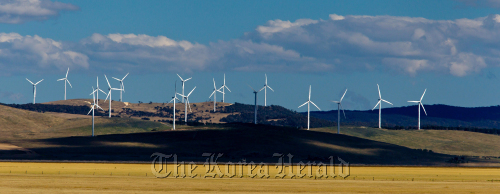U.N. Climate change panel says 80% of energy needs could be met by renewables by 2050
ABU DHABI (AFP) ― Renewable energy could meet nearly 80 percent of the world’s energy needs by mid-century and play a crucial role in fighting global warming, the U.N.’s climate scientists said Monday in a major report.
The 194-nation Intergovernmental Panel for Climate Change said renewable sources had grown rapidly, were widely competitive with fossil energies and, technically, had almost limitless potential.
But cleaner energy still faces formidable barriers, and governments must boost its development and peel back fossil-fuel subsidies for that potential to be realized, the panel cautioned.
“This report has a huge implication for the manner in which energy is going to be developed and used across the globe in the years ahead,” IPCC Chairman Rajendra Pachauri said at a press conference.
The thousand-page analysis, unveiled at a May 5-13 meeting of the IPCC, evaluates 164 development scenarios and is designed to guide decision-makers in government and business.
“Renewable energy sources can contribute substantially to human wellbeing by sustainably supplying energy and stabilizing the climate,” said Ottmar Edenhofer, a co-chair of the report.
The price tag will be steep, though. Different projections put it at $1.4 to $5.1 trillion for the coming decade, and another $1.5 to $7.2 trillion for 2021-2030.
ABU DHABI (AFP) ― Renewable energy could meet nearly 80 percent of the world’s energy needs by mid-century and play a crucial role in fighting global warming, the U.N.’s climate scientists said Monday in a major report.
The 194-nation Intergovernmental Panel for Climate Change said renewable sources had grown rapidly, were widely competitive with fossil energies and, technically, had almost limitless potential.
But cleaner energy still faces formidable barriers, and governments must boost its development and peel back fossil-fuel subsidies for that potential to be realized, the panel cautioned.
“This report has a huge implication for the manner in which energy is going to be developed and used across the globe in the years ahead,” IPCC Chairman Rajendra Pachauri said at a press conference.
The thousand-page analysis, unveiled at a May 5-13 meeting of the IPCC, evaluates 164 development scenarios and is designed to guide decision-makers in government and business.
“Renewable energy sources can contribute substantially to human wellbeing by sustainably supplying energy and stabilizing the climate,” said Ottmar Edenhofer, a co-chair of the report.
The price tag will be steep, though. Different projections put it at $1.4 to $5.1 trillion for the coming decade, and another $1.5 to $7.2 trillion for 2021-2030.

But if the benefits of curbing global warming are factored in, Pachauri said, this may be a bargain.
“These costs will still be less than one percent of the global GDP going up to 2050. This is an extremely significant figure ― it shows that the cost ... is within reach,” he said.
Six types of renewables accounted in 2008 for 12.9 percent of global energy supply: biomass (10.2 percent), hydro (2.3), wind (0.2), solar (0.1), geothermal (0.1) and ocean (0.002), according to the study.
Fossil fuels make up 85 percent and nuclear energy two percent.
Once traditional use of firewood and animal dung for heating and cooking is set aside, the clean energy share drops to about seven percent.
While still a small slice of a global energy mix, “growth in renewables has been very impressive,” Pachauri said.
New investment in 2010 stood at $243 billion, up from $186 billion the year before, Adnan Amin, director general of the International Renewable Energy Agency, reported at the press conference.
A majority of the scenarios reviewed show a “substantial increase” ― ranging from three-to-20 fold ― “in the deployment of renewable energy by 2030, 2050 and beyond.”
Clean energy’s share of future supply varied hugely across different forecasts, with the most conservative projecting a 15-percent share by mid-century and the most ambitious predicting it will cover three-quarters of all energy needs.
The first major report by the Nobel-winning panel since 2007 concluded that there is virtually unlimited technical potential for renewables, especially from solar energy.
“The opportunities are tremendous. We know that the technical potential for renewables is far in excess of demand,” said Amin.
Clean sources of power must play a critical role if the U.N.-backed goal of preventing average global temperatures from rising more than 2.0 degrees Celsius is to be met, the IPCC said.
U.N. climate talks have remained largely stalemated since the near collapse of the 2009 climate summit in Copenhagen, even as scientists warn that climate change is accelerating.
The report “underscores the irreplaceable potential of renewable energies to reduce greenhouse gas emissions,” said Christiana Figueres, the top U.N. official overseeing climate talks.
The report also said that clean energy solutions could “leapfrog” expensive traditional power sources to reach hundreds of millions of people living without electricity, especially in Africa.
“If you want to widen access to energy services in rural areas, there is a need to integrate renewable energy policies,” said Youba Sokona, another of the report’s co-chairs.
Green groups and renewable energy industry groups welcomed the report.
“This is an invitation to governments to initiate a radical overhaul of their policies and place renewable energy center stage,” said Sven Teske of Greenpeace International.







![[Graphic News] More Koreans say they plan long-distance trips this year](http://res.heraldm.com/phpwas/restmb_idxmake.php?idx=644&simg=/content/image/2024/04/17/20240417050828_0.gif&u=)
![[KH Explains] Hyundai's full hybrid edge to pay off amid slow transition to pure EVs](http://res.heraldm.com/phpwas/restmb_idxmake.php?idx=644&simg=/content/image/2024/04/18/20240418050645_0.jpg&u=20240419100350)





![[From the Scene] Monks, Buddhists hail return of remains of Buddhas](http://res.heraldm.com/phpwas/restmb_idxmake.php?idx=652&simg=/content/image/2024/04/19/20240419050617_0.jpg&u=20240419175937)

![[KH Explains] Hyundai's full hybrid edge to pay off amid slow transition to pure EVs](http://res.heraldm.com/phpwas/restmb_idxmake.php?idx=652&simg=/content/image/2024/04/18/20240418050645_0.jpg&u=20240419100350)

![[Today’s K-pop] Illit drops debut single remix](http://res.heraldm.com/phpwas/restmb_idxmake.php?idx=642&simg=/content/image/2024/04/19/20240419050612_0.jpg&u=)